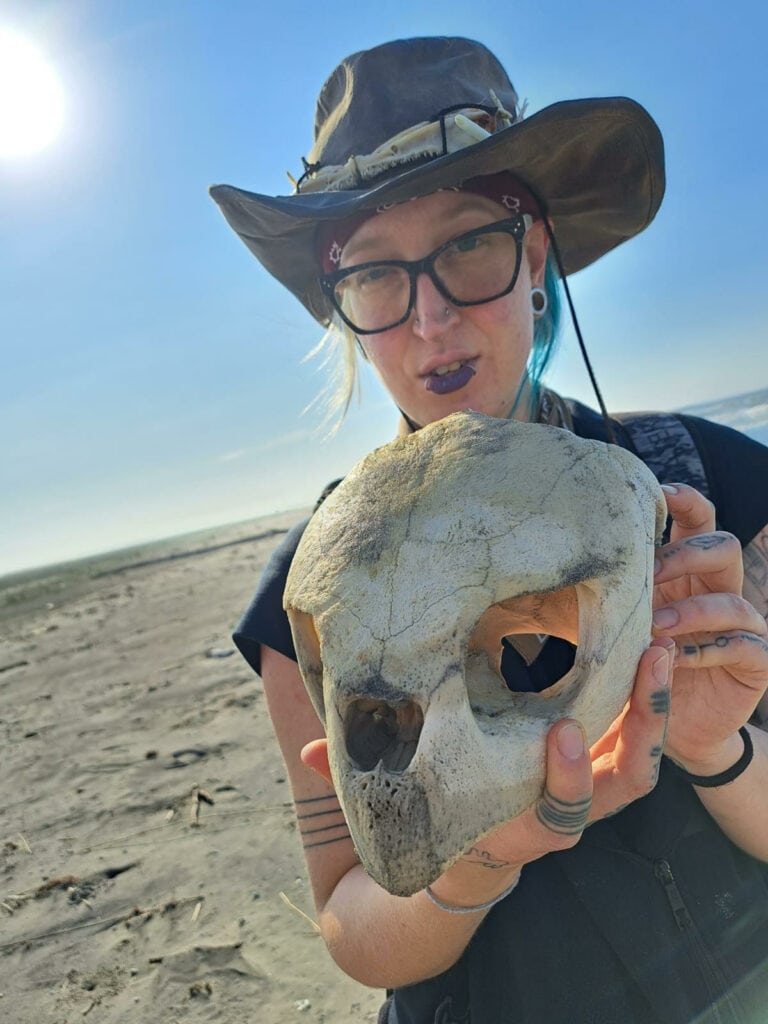In CO+nversation: Phoenix Roebuck
When Phoenix Roebuck played the 2017 O+ Festival, they weren’t quite sure what to expect. At the time, they were playing upright bass as part of the folk/Americana duo Roebuck with their then-partner Phil and had been introduced to the festival through a friend and longtime Kingston resident Brandy Walters.
“She said, ‘You know, it’s free healthcare,” Phoenix recalls. “And I remember thinking that we could definitely use some free healthcare.”
Back then, Phoenix says they were overdue to have their wisdom teeth removed but had delayed the procedure because they didn’t have insurance and couldn’t afford the dental work. During the festival weekend (and the day before Roebuck played their set) Phoenix went to see Dr. Tom Cingle to get those teeth out.
“It was such an amazing and incredible experience,” Phoenix said, adding with a laugh that they insisted on keeping the teeth afterward. “I kept them in a little jar that I wear on a necklace as a token and a reminder of like, ‘This was my payment for a festival I played in New York!’”
Throughout the three-day festival, Phoenix was able to access some other preventive services at the Artists’ Clinic, like a hearing exam and physical, in addition to complementary care like massage and acupuncture, all of which had previously been out of reach for them as a working musician.
“Being an artist of any kind is an incredibly challenging thing in our society here. It’s something that everybody wants to have – they want art, they want music, they want performance – but they don’t want to compensate people for [it], or help take care of them,” they said.
“O+ was one of the first spaces where I felt that it was really possible to have a world, this community of artists and society really co-existing and supporting each other…Everybody that was there to pitch in and help out was so compassionate and kind and thoughtful and helpful. I had so many things done for me while I was there and I just felt like I was home. I didn’t wanna leave. It was such a magical time. O+ is a very magical time and space. I believe every artist deserves that experience.”
After many years of touring and playing shows across the U.S., Phoenix says that one of the things that really stood out about O+ was the community-oriented atmosphere and commitment to health and well-being beyond just the Artists’ Clinic. They noted that while so many music festivals tend to be centered around booze, they were pleasantly surprised to see vendors selling things like kombucha and green tea. “It was refreshing to be somewhere that wasn’t pushing people to get hammered and [instead] actually have healthy substances to put into their body,” they said.
Phoenix shared that they also felt inspired by the diversity of artists and creators at that year’s festival, remembering one particular performance piece that involved the artist hugging a tree for several hours a day. “There’s a lot of imposter syndrome that comes with being an artist, no matter what your artistry is, and when I went to O+ they embraced every and all kinds of artists…And I thought that was so validating, and beautiful and inspiring and it was like, yes, all artistry matters and counts and is valid here.”
These days, their life looks a lot different than it did back in 2017. When the pandemic hit and playing live music was no longer an option, Phoenix had to pivot to other work to make income. That led them back to another passion focusing on wildlife conservation and protection, and they’re currently based in Louisiana working with sea turtle populations. In the meantime, Phoenix also separated from their long-term partner and bandmate and quietly put Roebuck, the duo, on the back burner.
“O+ is a very magical time and space. I believe every artist deserves that experience.”
They’re still making music and even working on a solo album, but it’s been a slow process – emotionally, creatively, and physically.
Like many O+ alumni, Phoenix understands first-hand just how access to healthcare (or lack thereof) can have a life-changing impact on artists and musicians. Last year, an accident at home left them unable to use their right hand – or play upright bass. They were changing a light bulb when it shattered, cutting into their right index finger and damaging the tendon.
“My first thought was, ‘Oh no, what have I done?’” Phoenix says. “I don’t have health insurance. Am I ever going to play again?”
Some friends encouraged them to go to an urgent care center nearby after the finger started swelling and showing signs of infection. Though they were able to get an X-ray and confirm the extent of the injury, Phoenix says the care they received overall wasn’t very helpful. They were bandaged and sent home, told to keep the finger immobilized for a little while but that it should heal up fine on its own.
In reality, the healing process took a lot longer. Phoenix says it was more than a year before they could touch their index finger to their thumb, or put any pressure on the finger without severe pain.

Without the use of that finger, they weren’t able to play their instrument. It felt like a devastating setback after several years of difficult change.
After the pandemic, and the end of touring, and splitting from their bandmate and spouse, Phoenix had focused their energy on music as a way to come to terms with all of these changes. “Music is so cathartic to be able to sit and play. I’ve had so many sessions where I’ve sat with my instruments and just wept playing through them because it’s a different language that your body is speaking when you play an instrument,” Phoenix says.
Without the ability to play, they felt lost.
“It put me into a spiral of depression, I’m not gonna lie,” they say. “This [injury] was such a huge blow because then I felt like all my power and ability to do what I knew how to do musically was just taken away from me because I didn’t have access to healthcare. I couldn’t afford what it was gonna cost to tend to my hand and I just had to hope that it was gonna get better.”
More than just hoping for recovery, Phoenix got to work, determined to get back to making music. They bought finger braces and scoured the Internet for physical therapy tutorials, slowly and painfully practicing finger exercises every day. It took six months of dedicated work just to bend their finger, and several months more before they had full articulation.
“I’m so incredibly grateful that I have the use of my finger back today and that I can play my bass again,” Phoenix says. “Healthcare is so necessary for musicians. It’s that easy for it to be taken away from you. It’s so, so easy.”
Reflecting on the injury and the arduous path to recovery, Phoenix wonders out loud how different their experience would have been if they’d been able to get the care they needed, both for their mental and physical health and well-being.
“The lack of accessibility of healthcare for artists and musicians is absolutely detrimental to our health and wellbeing and our ability to move forward,” they say. “It even takes away our ability to take risks as artists because we’re worried about what could happen…And O+ gives that back to artists, it gives them that peace of mind, that comfort.”
To find a sense of grounding and catharsis during their recovery, Phoenix says they sought out other instruments that didn’t require as much use of their right index finger to try and force some creativity. They learned ukulele and kalimba and dabbled a bit with cello and accordion.
“Anything to get some musical movement in me and through me,” they said. “I think music is such a divine gift to be a part of and participate in and is something I never wanna lose touch with or take for granted. That’s why I insisted on pushing myself to try and play something, anything through this injury because I didn’t want to lose touch with that divinity.”
“To play music is something that I wish for anyone and everyone who wants to do it. Music is life to me.”
Today, Phoenix is still making music and thankfully, still playing their upright bass. They’re working on their first album as a solo artist, and taking their time to develop and create their own sound. There’s still a lot to work through, and Phoenix still has to take breaks from playing – though much improved, they’re still regaining strength in that right hand. But they’re doing it, little by little, day by day.
“When I have my collection of songs ready to perform then I’ll feel like I’ve made it. Like, I’ve made it to the other side of this injury, I made it to the other side of all of this,” they say.
“It’s almost there. I’m almost at the top of the hill.”
